...how much time could you save throughout the rest of your career?
Consider how much you are spending on your health and fitness goals -- doesn't your writing deserve the same investment so you can build a career that's fulfilling and stress-free?
📣 Brand new training: The 3 Simple Steps to Get Published and Enjoy Writing Again. Save your seat now!

And develop a structured writing process so you can get published in top-tier journals time-efficiently
If you…
…the answer is probably yes! Confirm by watching the training below.
…if you want to learn how to write clear & concise research papers for high-ranking journals in a timely manner —even if you aren’t a native English speaker!
I used to offer only workshops for groups of researchers. But: They started at $5000 USD and researchers couldn’t sign up for them individually.

That’s why I’m so excited to welcome you to this academic writing program! The Researchers’ Writing Academy is for scientists and researchers who write research papers based on data they have gathered, whether qualitatively or quantitatively. Our program is a good fit for researchers in the health, physical, earth, life sciences, psychology and related fields.
…so you can spend less time on writing papers and can start getting published in high-ranking journals!
Before enrolling in the Researchers’ Writing Academy, I felt like I was drowning in a writing sea. I had the world of time and resources but I simply did not know what to write.
I followed Anna’s structured writing plan and I could see that my writing started to flow. The storytelling approach kickstarts the process of writing a paper for me and my introduction sections aren’t lengthy anymore but focused. I actually started to enjoy the writing process itself! I always knew I had it in me, and the Researchers’ Writing Academy was the key to that portal. This is by far the best course I have ever attended (not only on writing but in general)!
As soon as I finished the course, I produced two papers. I am now publishing actual papers that I believe anyone would love to read! And that is my foundation stone for the science journey I am about to embark on.


Let’s make those never-ending iterations with your co-authors a thing of the past and start writing papers in a structured and time-efficient way.
Whether you have a large English vocabulary or not, the Journal Publication Formula gives you a structured plan of what should go in each section and makes sure that you are communicating even complicated concepts in your paper effectively.
But that isn’t all. The Journal Publication Formula takes away the pressure of selling your paper by organising your whole paper around the honest story your data is telling making it intrinsically compelling to read. Are you ready to massively decrease the chances of getting desk-rejected?

Learn the most efficient workflow to write your paper and map it onto your calendar. Internal deadlines aren’t enough though, you’ll also learn to master committing to your writing sessions!
In addition, you’ll understand how to integrate your co-authors in the process and manage common ”writing wrenches” such as perfectionism, fear of rejection and writer’s block, so you’re all set up for a streamlined writing process.
Download your writing project plan to make the writing process efficient!
Master the scientific story framework, a no-fluff system to introduce a coherent narrative into your paper from the very beginning of the writing process.
You define the reader of your story and construct your argument
(yes, science papers need an argument too!).
Download your key story elements worksheet and your storyboard template to guide you through the process!


You use the key story elements defined in Module 2 to start outlining each section of your paper. You create section and paragraph outlines for the Introduction, Results and Discussion sections.
The paragraph template for writing the Results sections makes sure that you are guiding your reader through your argument with flow.
You’ll also learn why the References section shouldn’t be an afterthought and how to select studies to cite in your paper.
It’s finally time for writing your first draft! All you need to know about good writing are the 5 foundations of clear and concise writing — no need for an advanced English language class!
You will also be walked through how to effectively present your findings visually, aka how to make good Figures.
And when your first draft is ready, you can use our step-by-step process to edit your own writing effectively — so you always know when to stop perfecting your paper.


You are SO close to submitting your paper!
Learn how to write a compelling title, abstract and cover letter that are in line with the narrative of your paper in no time!
Psssst: You’ll use the key story elements defined in Module 2 again.
Download your templates for writing the abstract and cover letter!
And then we celebrate with you when your paper is:


Learn the most efficient workflow to write your paper and map it onto your calendar. Internal deadlines aren’t enough though, you’ll also learn to master committing to your writing sessions!
In addition, you’ll understand how to integrate your co-authors in the process and manage common ”writing wrenches” such as perfectionism, fear of rejection and writer’s block, so you’re all set up for a streamlined writing process.
Download your writing project plan to make the writing process efficient!

Master the scientific story framework, a no-fluff system to introduce a coherent narrative into your paper from the very beginning of the writing process.
You define the reader of your story and construct your argument
(yes, science papers need an argument too!).
Download your key story elements worksheet and your storyboard template to guide you through the process!

You use the key story elements defined in Module 2 to start outlining each section of your paper. You create section and paragraph outlines for the Introduction, Results and Discussion sections.
The paragraph template for writing the Results sections makes sure that you are guiding your reader through your argument with flow.
You’ll also learn why the References section shouldn’t be an afterthought and how to select studies to cite in your paper.

It’s finally time for writing your first draft! All you need to know about good writing are the 5 foundations of clear and concise writing — no need for an advanced English language class!
You will also be walked through how to effectively present your findings visually, aka how to make good Figures.
And when your first draft is ready, you can use our step-by-step process to edit your own writing effectively — so you always know when to stop perfecting your paper.

You are SO close to submitting your paper!
Learn how to write a compelling title, abstract and cover letter that are in line with the narrative of your paper in no time!
Psssst: You’ll use the key story elements defined in Module 2 again.
Download your templates for writing the abstract and cover letter!
And then we celebrate with you when your paper is:

I absolutely love, love the course. Anna gave me a formula that really makes sense. Once I watched the first module, I was hooked!
During my enrollment, I worked on two first-author papers using the Journal Publication Formula. One of them was recently published.
I consider myself fortunate that I found out about the Researchers’ Writing Academy.
Anna’s formula turns a complicated and oftentimes daunting task into an easy to follow method. This formula removed the barriers I had in my writing process, and helped me with task initiation, organization, and goal-making.
I now have a clearly written manuscript that delivers my results, and demonstrates their impact from the first sentence to the last.
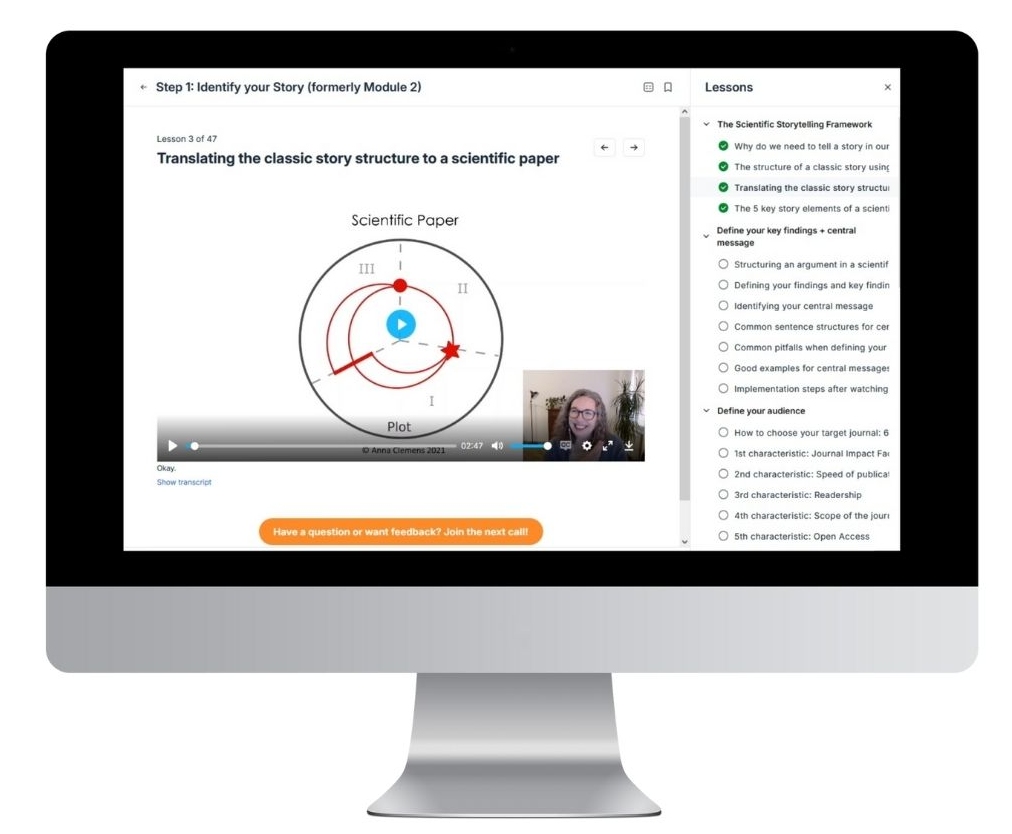
This self-paced online course guides you through the whole process of writing a paper for a top-tier journal time-efficiently. With a couple of exceptions, all lessons are way under 10 minutes allowing you to fit them into small gaps in your schedule or to zip through the course and keep the momentum up. The course is structured in a way that allows you to develop and write your paper alongside the lessons. Worksheets, templates and checklists help you implement what you have learned in every step. The course (as well as all other program components) is hosted on the platform Circle.


You won't have to worry should you ever get stuck at any point in the writing process. Every month, we host a Writing Feedback Call where you will receive tailored reviews of any part of your paper or worksheet. We also host monthly Scientific Storytelling Workshops that allow you to build a deeper understanding of the framework we teach you to develop the story of your paper, practice defining powerful key story elements and receive expert feedback on your storyboards. The calls are also a great opportunity to connect with the other members in the Academy and build connections.
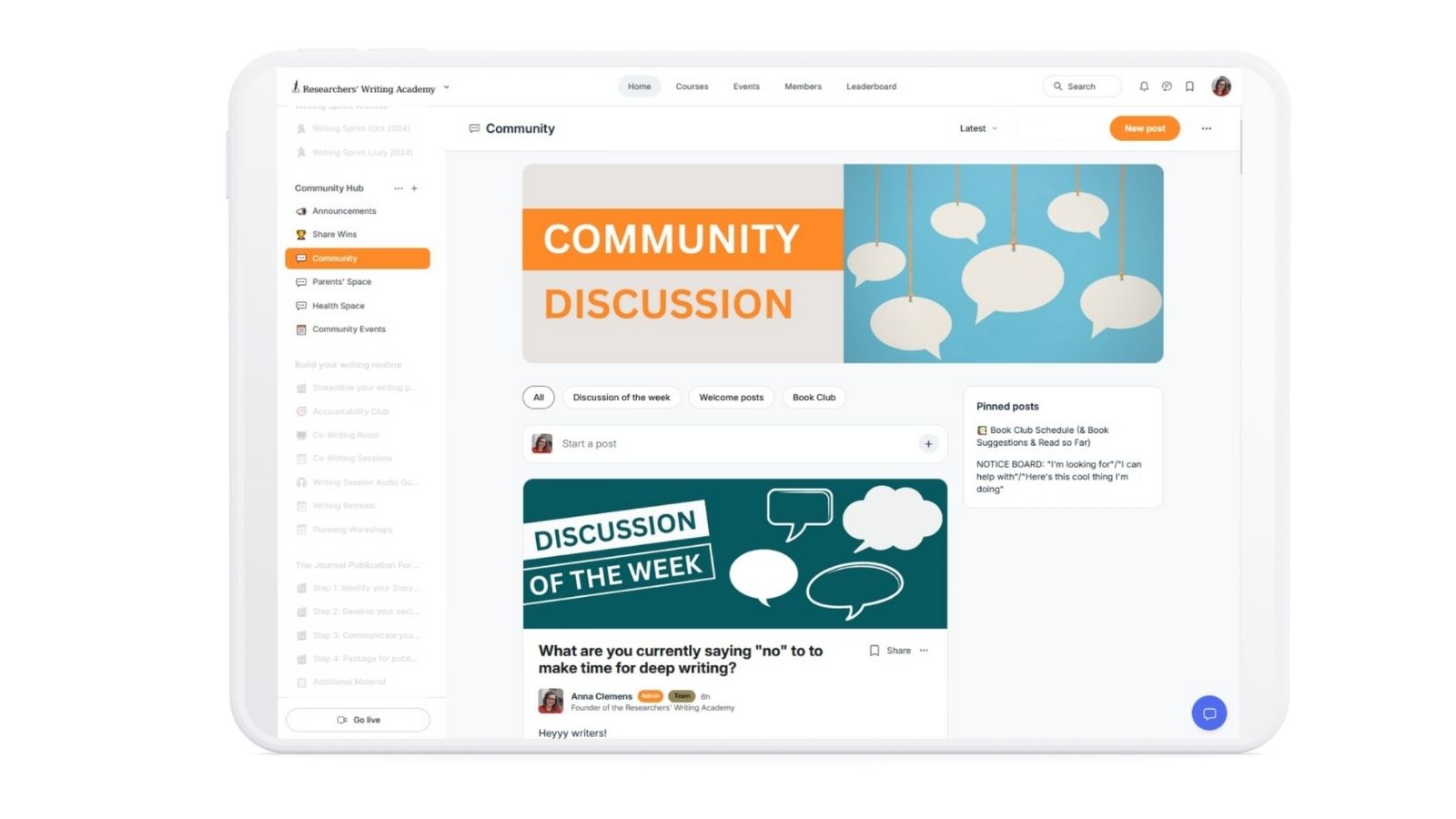



Writing doesn’t have to be lonely. Our members-only community is a space to network with researchers who are going through the same writing journey you are. Here, you get to ask every question, share your struggles (even if it's just to vent), celebrate wins, connect with and get advice from researchers outside your institution, across fields and career stages -- which is so, so valuable! Become part of a network of researchers from all over the world — we have members in the US, UK, Australia, Italy, France, Germany, Canada, Denmark, Austria, New Zealand, Israel, Sweden, Czech Republic, Ireland, South Africa, Colombia, Turkey, Brazil, Netherlands, Lithuania, Spain, Poland, South Korea, Sri Lanka, Sudan, Japan, India, Kenya, UAE, Romania, Thailand, Slovenia, Saudi Arabia, Kuwait, Portugal, Uruguay, Mexico, Jordan, Morocco, Singapore, Ethiopia, Indonesia, Norway, Chile, Switzerland and counting.




Inside the Researchers' Writing Academy, you will be part of a holistic accountability structure:
Weekly Check-Ins. You can join our Accountability Club where you receive an email every Sunday prompting you to plan your week and share your plans with the community. On Fridays, we follow up with you and invite you to share how your week went.
Co-Writing. Meeting up with others to co-write will be your new productivity superpower. It's really hard to commit to writing dates with just yourself consistently, especially when more urgent (and often more vocal) demands are competing for your time. That's why we facilitate several Co-Writing Sessions per week across timezones. We also facilitate several half-day Writing Retreats per month across timezones with 3 consecutive co-writing sessions including guided goal-setting and meditation at the beginning and reflection and celebration during breaks and at the end. Outside of the facilitated sessions, our Co-Writing-Room is always open for you to meet with other program members.
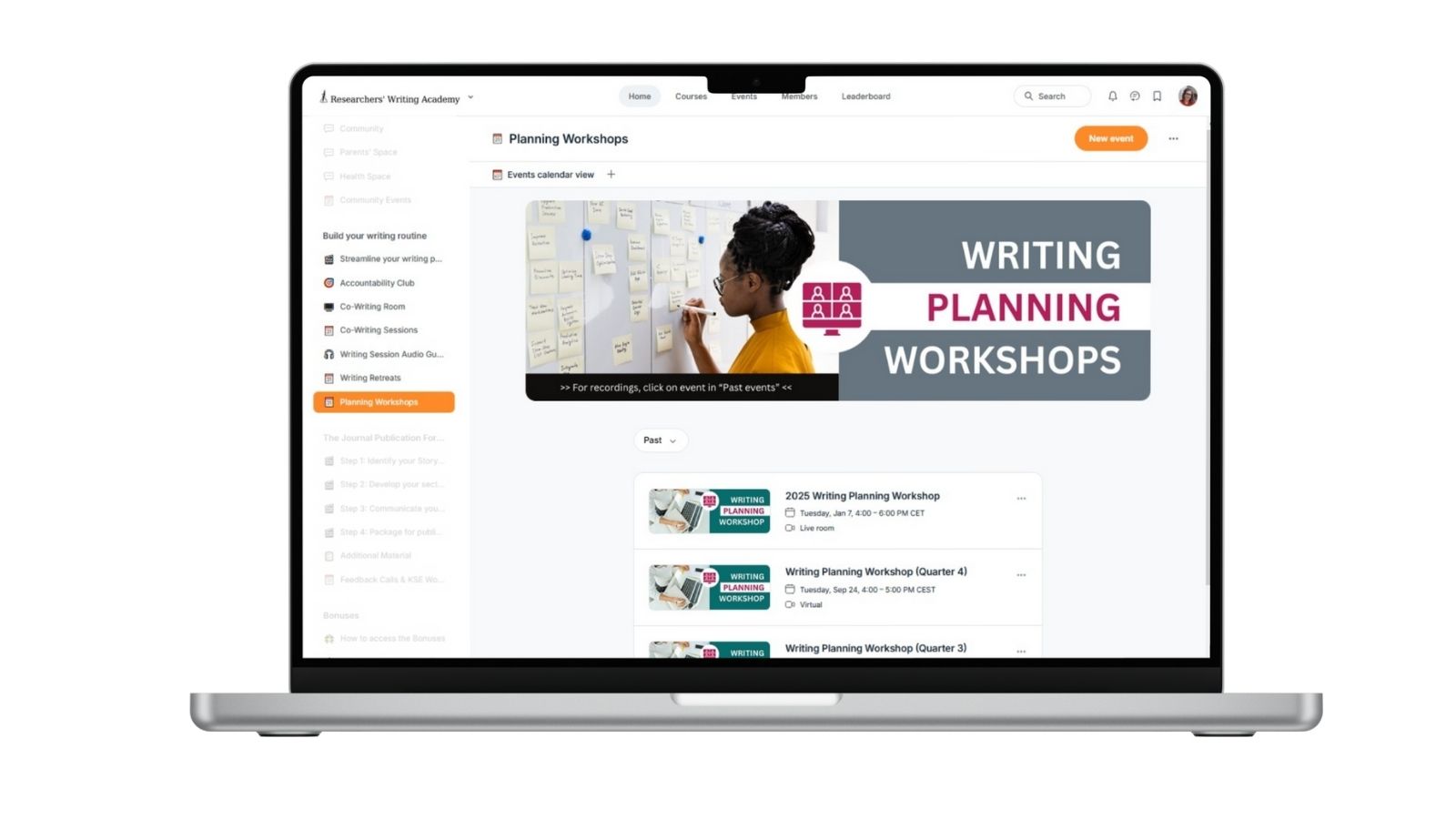
Through live quarterly live workshops and monthly prompts, we help you make realistic writing plans for the year, quarter and month that enable you to i) hyperfocus on what's most important at every point in time, ii) establish and maintain a writing routine that works for you and iii) learn how to set realistic writing goals so you feel accomplished and start enjoying your writing practice.
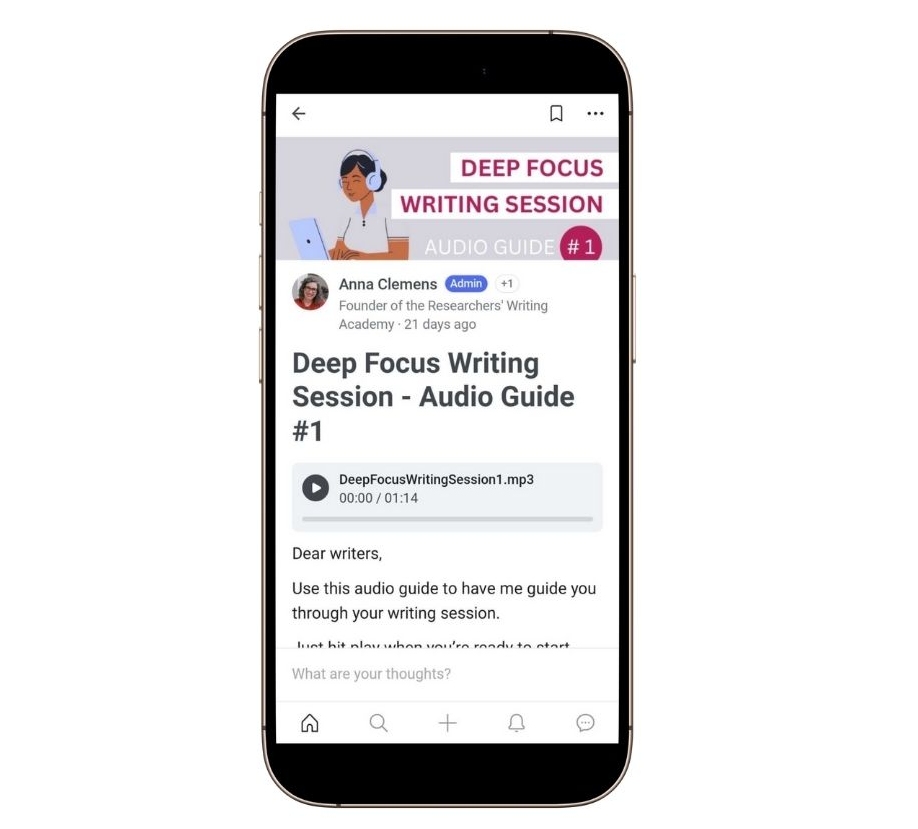
Whenever you prefer writing on your own to co-writing, you won't be left to your own devices: In our audio guides, Anna's voice guides you through productive writing sessions by helping you take breaks, set goals, and meditate before writing for maximum focus. We keep adding more with different themes according to our members' needs. As one of our latest additions, these have become game-changers for our members allowing them to focus more deeply and be more structured in their writing time.
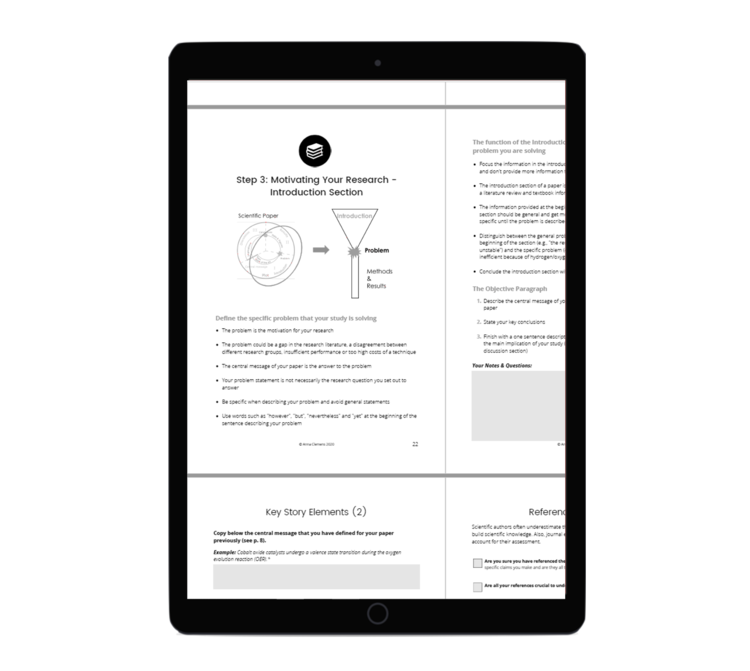
You will receive a fillable PDF course companion workbook. Summarising the key points from the lessons, the workbook works as a detailed checklist that guides you through the paper writing process. Previous members have told me to publish and sell the workbook on its own because using it to write a paper was suddenly so efficient for them.


Many of our members love reading and we like to stay up-to-date with books on topics such as productivity, time, energy and stress management, slowing down, staying sane in academia, dropping the ball, resisting perfectionism etc. We meet roughly every two months to discuss a book. A few member favourites in the RWA Book Club have been "Slow Productivity" by Cal Newport, "Making time to write" by Cathy Mazak and "How to Take Smart Notes" by Sönke Ahrens. We welcome your suggestions!
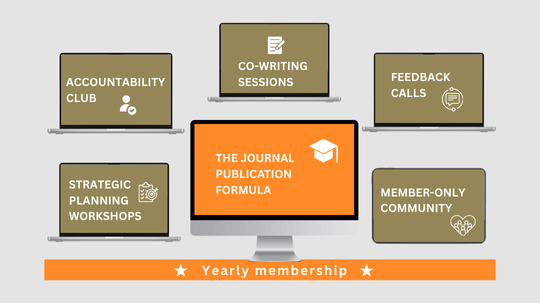
MONTHLY SUBSCRIPTION
$97 USD/MONTH
(+ VAT for EU customers)
Initial 12-month commitment
ANNUAL SUBSCRIPTION
$997 USD/ YEAR
(+ VAT for EU customers)
Save $167 USD!
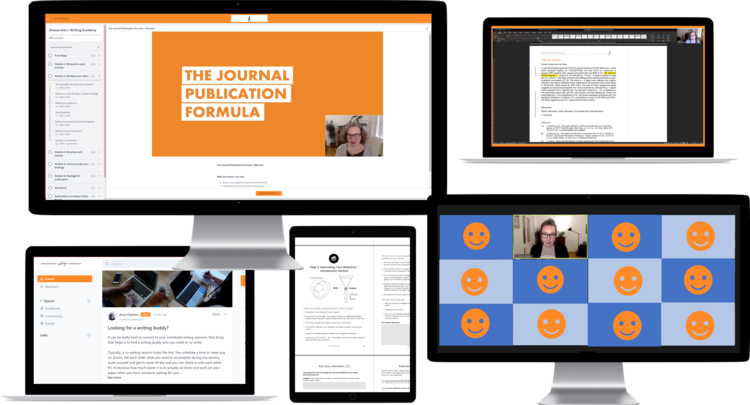
(+ VAT for EU customers)
(Save $167 USD!)
(+ VAT for EU customers)
Initial 12-month commitment
Before enrolling in the Researchers' Writing Academy, I approached academic writing as something tedious that I needed to do. I struggled to know what story I wanted to tell in my papers and my writing always seemed kind of chunky and disconnected. More often than not, my co-authors and I would end up having an editing nightmare!
Now, after joining the course, I have confidence in my writing skill. I know exactly what I need to do, how to structure paragraphs and how to make my writing flow. Anna is very patient with her students and able to pick up the story of a paper quickly - no matter the research field.
Writing a paper with co-authors is now a much smoother process. I can now write a draft in just four weeks – if I’m clear on my results and fully in writing mode. The other big change is that I have started to really enjoy writing. Being able to see a year-long project turn into a well-written manuscript is so much fun!
Since enrolling in the course, my papers read so much better and I have already published one paper (that was highlighted by the journal as paper of the month!) and two more are on the way!
Writing was dreadful for me. I had to write one last paper from my PhD and I had no motivation to do that because the paper had been rejected twice already and I had moved to a new role and discipline.
The Journal Publication Formula gave me that clear vision of why people should care about the research and that made it easier to write the paper! It helped me organise my thoughts and the structure of the paper. The paper is under review now, so it passed the first test: It didn’t get desk-rejected!
The prorgram helped me to enjoy writing and I think it made me a better academic! Because if you enjoy writing papers, you are going to write more of them.
The program is definitely worth the money spent because you get the hang of how you want to structure your papers. Going through the process of the Journal Publication Formula gave me confidence into defining my own voice and what I wanted my papers to be like. It’s an investment into my future self.


I'm not asking you to make a decision now. Enrol in the Researchers' Writing Academy today and explore the program so you can make the most informed decision. Should the program not be the right fit for you (for whatever reason), you will receive a full refund up to 14 days after enrolling.

The awesome thing about joining the Researchers’ Writing Academy is that you don’t only get access to the academic writing course, you also get to meet researchers who are in the exact same boat as you. You can connect in our member-only community and meet for our weekly co-writing sessions and twice-monthly writing retreats.
Current members and alumni of the Researchers’ Writing Academy are based at the Delft University of Technology (Netherlands), Stanford University (US), University of Michigan (US), University of Cambridge (UK), Harvard Medical School (US), ETH Zürich (Switzerland), University of Edinburgh (UK), The Arctic University of Norway, National Institute of Health (NIH; US), National Health Service (NHS; UK), Cornell University (US), University of Auckland (NZ), Karolinska Institute (SE), Trinity College Dublin (IE), MIT (US), Yale University (US), CNRS (France), Heidelberg University (DE), Cancer Research UK, Emory University (US) and many, many more.






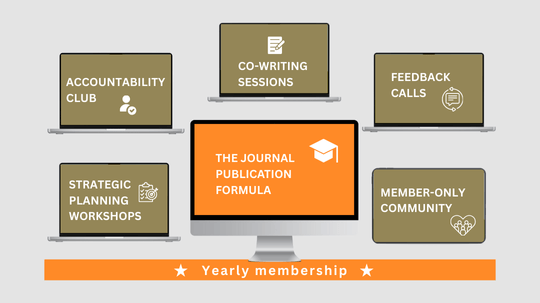
(+ VAT for EU customers)
Initial 12-month commitment

(+ VAT for EU customers)
Save $167!
I really enjoyed the course. I am an excellent writer and have been writing and submitting manuscripts for a while. However, the course significantly improved my process of engaging with and receiving feedback from my co-authors.
The particular breakthrough I received in the RWA was with regard to the necessary work prior to writing, especially with regard to creating an outline prior to committing to a full manuscript. It sounds like a simple intervention; but it really changed the way I interact with my co-authors. It has cut down significantly on major edits of fully written manuscripts and allows me to fully engage co-authors early on in the manuscript-writing process.
Now there is less confusion and fewer surprises during the writing process!
The most concrete result after joining the Researchers’ Writing Academy is that my second PhD article has just been published in One Earth and the fact that it attracted media attention! It was really rewarding!
But what is more important is that I now have confidence in the whole writing process and that is life-changing for me.
I used the Scientific Storytelling Framework taught in the course not only to write my paper but also to prepare for the interviews with journalists.
I think the Researchers’ Writing Academy is the only program available that teaches you how to organise the whole writing process so you produce a scientific paper that gets published.
The question isn’t how much time you could save by mastering a repeatable system to write clear and concise papers.
...how much time could you save throughout the rest of your career?
Consider how much you are spending on your health and fitness goals -- doesn't your writing deserve the same investment so you can build a career that's fulfilling and stress-free?
Anna’s class was the most valuable time I spent trying to improve my writing skills. I finally feel like I have an effective recipe that will help me overcome my long-standing fear of turning results into a compelling document.
Join us now and get immediate access to the only blueprint you will ever need to get published in high-ranking journals while leaving the land of procrastination behind!

(+ VAT for EU customers)
MONTHLY SUBSCRIPTION
Initial 12-month commitment
(+ VAT for EU customers)
ANNUAL SUBSCRIPTION
Save $167!

(+ VAT for EU customers)
(Save $167 USD!)
(+ VAT for EU customers)
Initial 12-month commitment
Before joining the Researchers’ Writing Academy, I was questioning if I belonged in academia – AND whether or not someone was going to figure out! My writing was disorganised and the feedback I would often get was something along the lines of “we don’t think your research fits in our journal” even though I thought it fitted perfectly.
The Researchers’ Writing Academy has helped me understand in a tangible way how to communicate my research through storytelling. And I already got a Revise & Resubmit! I got so much confidence from this program and this is a big deal for me. Now I’m fully committed to my academic career!
Anna demonstrates in the course that she actually knows the information she’s teaching and isn’t just regurgitating what others have said in the past. She really hooks her audience!
On a broader level, I have understood that we researchers aren’t just all bad communicators. Rather, the reason why we often don’t communicate well is that we don’t know the process or structure to communicate better. And that’s fixable!
Maria Olczak, PhD candidate at Queens Mary University of London, shares her experience in the Researchers’ Writing Academy.
Dr Amelie Jeanneau, bushfire risk researcher at The University of Adelaide in Australia details how she got the confidence to define her own voice through the Journal Publication Formula.
Dr Katia Canenguez, Health Disparities researcher at Massachusetts General Hospital/Harvard Medical School shares her experience in the Researchers’ Writing Academy.
An interview with a medical scientist at the National Institute of Occupational Health in India who reflects on her writing since joining the Researchers’ Writing Academy.
Dr Jia Ng, Assistant Professor at the Zucker School of Medicine in the US, reflects on her writing and her writing process since joining the Researchers’ Writing Academy.
Dr Jourdan Davis, Assistant Professor at the University of North Carolina, reflects on her writing since joining the Researchers’ Writing Academy.


Did you know you can get your institution to invest in your professional development?
>> If you are currently in the process of getting funding from your institution, send me a message here so I can reserve a spot for you at the current price! 🔖 <<
Here are questions other researchers often ask before joining the Researchers’ Writing Academy:

(+ VAT for EU customers)
MONTHLY SUBSCRIPTION
Initial 12-month commitment
(+ VAT for EU customers)
ANNUAL SUBSCRIPTION
Save $167 USD!

(+ VAT for EU customers)
(Save $167 USD!)
(+ VAT for EU customers)
Initial 12-month commitment
I made this video to answer your questions about how to get published in top-tier journals without lacking structure in the writing process. You’ll understand how to avoid the three top mistakes researchers make when writing scientific papers that get them stuck in procrastination and desk-rejection territory.
*The coaching calls will be recorded and available to all participants of the course for 12 months from the date the call took place.
Testimonials. I present real world experiences, testimonials and insights about other people’s experiences with my programs and services for purpose of illustration only. The testimonials, examples, and photos used are of actual clients and results they personally achieved. They are not intended to represent or guarantee that current or future clients will achieve the same or similar results; rather, these testimonials represent what is possible for illustrative purposes only.